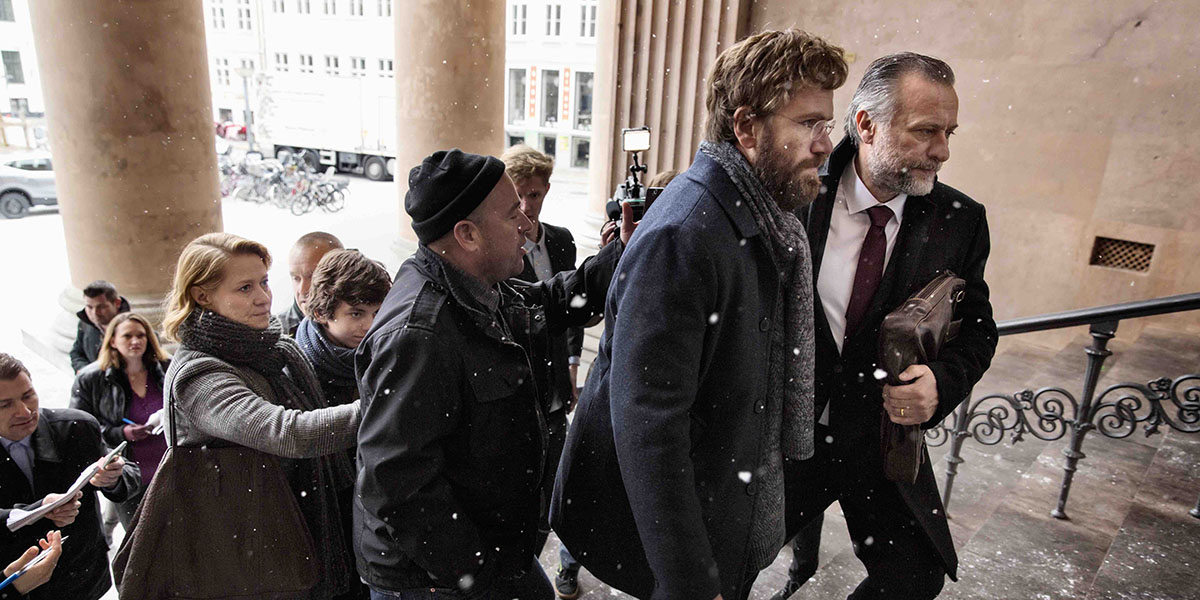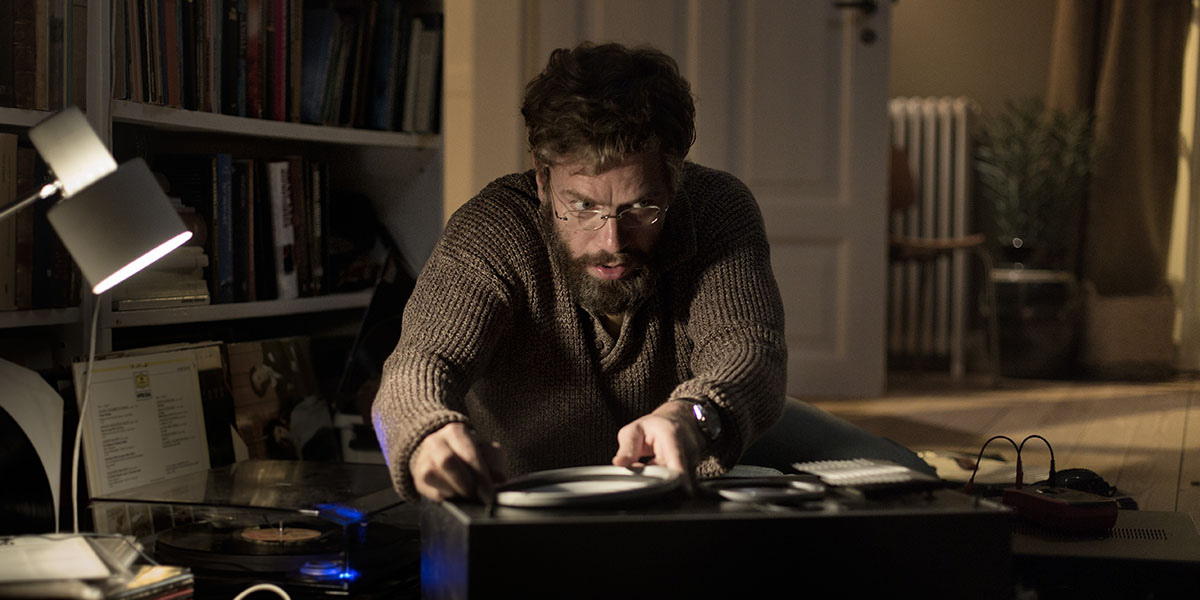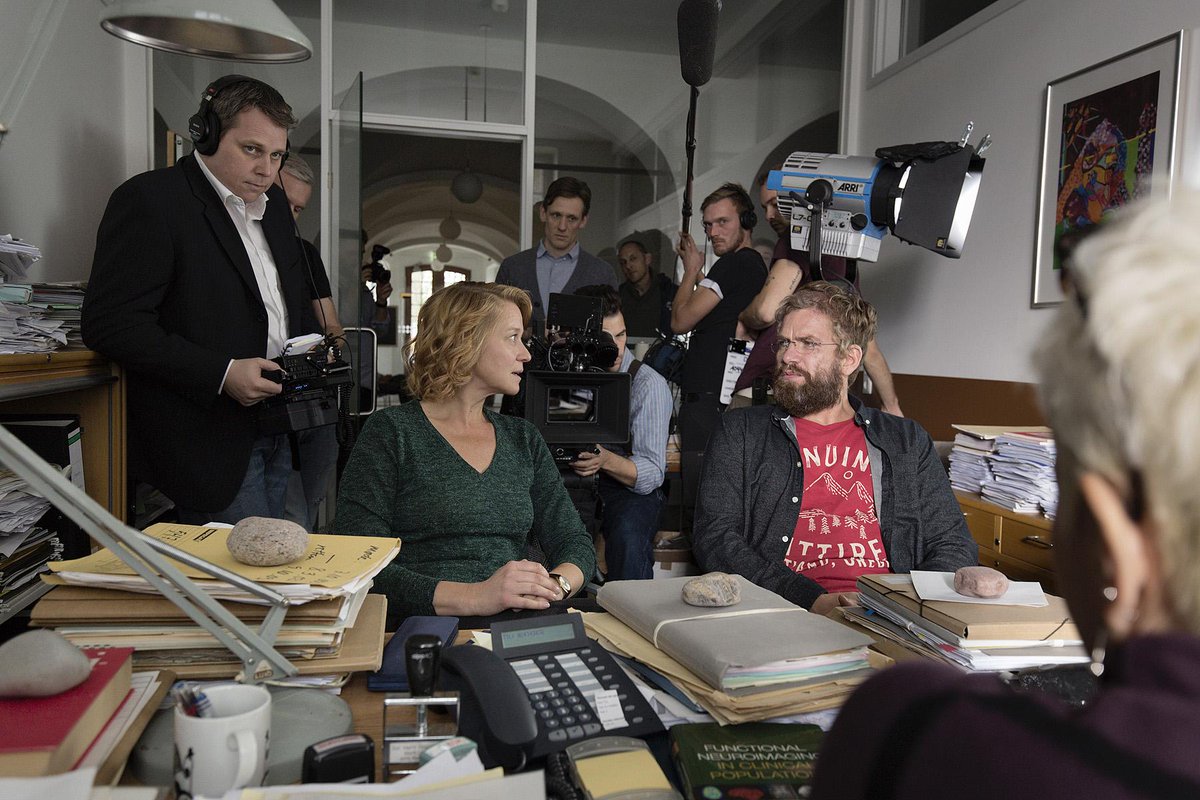By Jose Solís.

Since his breakthrough performance in The Idiots, where he played the sensitive, tragic Jeppe, Nikolaj Lie Kaas has remained one of the most interesting male actors in the world. Jumping from genre to genre, and from big Hollywood productions, to intellectual television series, his body of work is as varied as it’s complex. He’s played real life people, an assassin trying to thwart Tom Hank’s plans, a romantic hero, and one of the most beloved literary characters in contemporary Scandinavian fiction. But in Peter Schønau Fog’s You Disappear he reveals layers previously unseen as he plays Frederik Halling, a school headmaster whose world is shaken when he’s accused of embezzlement. Could it be that the brain tumor affecting his personality is to blame, or has Frederik always been this way?
The late, great Michael Nyqvist plays Frederik’s lawyer, and Trine Dyrholm plays his loving wife. You Disappear has been selected to represent Denmark at the Academy Awards next year, so I caught up with leading man Kaas, to discuss his work in the film, the way in which he approached a character like Frederik, and his opinion on awards season.
Read the interview after the jump.
JOSE: Frederik is going through a severe health crisis, but the way in which his brain tumor alters reality around him, made me think of the way in which we are bombarded with lies on the media daily. Being a healthy man yourself, was this an entry point into the character?
NIKOLAJ LIE KAAS: It is a huge question you’re asking. There’s also two dimensions to it, when we shot the film we did multiple takes and the most calm version we did was always the last one. We had a lot of scenes where there were a lot of reactions of empathy, when you have this condition you don’t interact with other people, sometimes you react like a psychopath. To play a character like this you avoid all the questions, emotions that come at you all the time, so when you look at the world today and ask yourself how you’re reacting to everything, you need to be open.
JOSE: I’ve heard from other actors that acting is like a puzzle, is Frederik then like a puzzle with pieces from different puzzles?
NIKOLAJ LIE KAAS: Initially we had a lot of different reactions, he changed personalities like ten times a day. The funny thing is when you’re living with a person like this, for instance when a husband gets dementia the doctor tells the spouse they will no longer be the person they married and wives usually find those little moments when their husbands are who they were. But that person isn’t there anymore. You can make it up yourself in your own perception. When the wife gets dementia and the husband is told she won’t be the same, I’m about to generalize, but when husbands get told that reality they leave the wives because they know it won’t hurt them. I don’t know why men are so cynical. The fact is if you’re completely gone, everything that happens every day is spur of the moment, there are no constants.

JOSE: You’re no stranger to starring in book adaptations, do you use the books as a resource as well, or just stick to the screenplay?
NIKOLAJ LIE KAAS: I was very into the book, it’s just amazing. The book was the main reason I wanted to do the film, it’s always impossible to adapt a book completely because this person you have a perception about when you first read the book or script, are perceptions you carry on. My first meeting with these characters is often the most truthful, the feeling I get after I read a script for the first time is the same, it’s when you develop your love interest with the material. You can’t dissect it, in the beginning you just feel it and I’m always holding onto that moment.
I think everyone was heartbroken when Michael Nyqvist passed away last summer. Can you share your experience on getting to work with him in what was one of his last films?
I worked with him when I did my first movie, it was a short I did for a friend of mine in film school. It must’ve been 1998, I worked with Michael and we just clicked. I couldn’t stop laughing, he was hilarious. When we met again it was the same, there’s a picture someone took from a court scene in You Disappear where in between takes he was making me laugh, it’s a perfect image of what it was like to work with him. He was very giving, he was very caring, we hung out a lot when we worked together. I was devastated, it was the first time apart from my parents, that I was so heartbroken when someone close to me died.
You’re doing a lot of TV work lately, and have also played the Carl Mørck character in three movies. Since there’s a few years in between films do you find it easy to slip back under Carl’s skin when you return to him, and is that the same case for working on different seasons of TV shows?
When you go back to a character you’ve played before there’s this danger that you’ll copy yourself. You know this character and it’s easy for you to approach, but you have to reinvent yourself. It’s so hard to accomplish this with a character as stoic as Carl, but I know I need to do something different. When we did the first movie we had no clue if we were doing enough, I was walking around in a haze and I couldn’t see if I was communicating to people that Carl was going through emotions. We realized that worked, so I realized that the doubt was the driving force. I don’t want to lean on something I did and was successful. It’s important to approach every project with doubt and humility.

When you go back and see your work is there a sense of dissonance when you don’t recognize yourself in something like The Idiots for instance?
I don’t feel that, I’ve seen a lot of stuff and sometimes you do wonder how did I end up there? But everything you do is choice, not just the characters you play, but how you play them. It’s interesting to look at how you approached something, I usually look at them through my friends, family or when strangers tell me they loved something. My perception of a situation has nothing to do with how other people see it. People will always have a different perception of who I was when I made a film. It’s funny that people perceive your personality is the same as the characters you play.
You’ve mentioned you think we’re in the Golden Age of Television, so in your free time what are the shows you binge watch?
I binge a lot of stuff people love, I’ve been watching Breaking Bad. I watch a lot of shows actually, I watch Billions, I’m looking forward to more Stranger Things, I also saw the Italian TV show Gomorrah. I see what most people see, I’m very populistic, I’m not a connoisseur.
What does it mean for you to be the lead actor in the Danish Oscar submission this year?
I acknowledge the fact that this film is an acquired taste and this was the director’s intention from the beginning. This is Peter’s vision, he was committed to it perhaps more than any other director I’ve worked with, it’s his masterpiece. I’m looking forward to seeing what will happen to it and how people will perceive it. This is a very slim kind storytelling, it’s not for the many. I loved it.

Foreign Language Film Coverage
Quit Staring at My Plate - Croatia - Interview
Felicité - Senegal - Interview